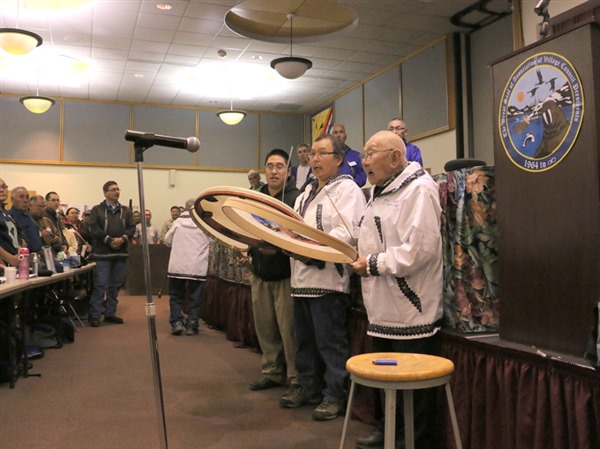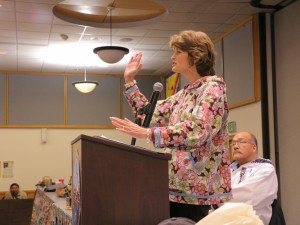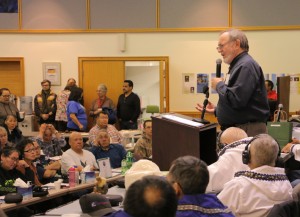Leaders from around the state gathered in Bethel Tuesday for the 50th Annual Association of Village Council Presidents Convention. Dignitaries and political leaders form across the state attended.

The Association of Village Council Presidents Convention opened at the cultural center in Bethel Tuesday. Julie Kitka, President of the Alaska Federation of Natives was the keynote speaker. She reported on two major wins in the courts for Alaska Natives this year, highlighting a federal judge’s order that the State of Alaska translate voting materials into Gwich’in and Yup’ik for Alaska Natives with limited English.
“When we talk about that we have major fights that are going on with the State of Alaska and that we are trying to protect our peoples’ rights on that, it’s very real. It’s sad that we have to do that but we’re very proud of these Native Individuals that testified as witnesses and that the judge listened and saw the truth of what they were saying,” said Kitka.
Kitka also noted a U.S. Supreme Court decision to end the Katie John Subsistence Case after 19 years of litigation as another victory.

AVCP is a non-profit organization representing the 56 federally recognized tribes of the Yukon-Kuskokwim Delta. During the Convention tribal representatives meet in Bethel to work on critical issues.
Republican Senator Lisa Murkowski and Republican Representative Don Young also addressed the Convention. Senator Murkowski said the federal and state governments need to respect Native rights.
“There’s so much tension as we talk about things like jurisdiction as we talk about our ability, your ability to govern yourselves. And I think the tension comes because we’re missing that respect, that respect from the federal government and the state government respecting you and your tribal institutions and you as a people,” said Murkowski.

Representative Don Young also encouraged Native communities to take initiative to improve their own communities, especially when it comes to drugs. He said improving economic opportunities for young people is one important part of fighting the regions drug problems, but he also said it will take confronting people they know who are selling drugs.
“If someone’s screwing up in your village, he should be asked to leave. You don’t want to do that. It can’t just be enforcement from the outside cause very frankly, that’s a foreigner. It has to come from here. And you know who the drug dealer is in that town. You all know who it is. You say I can’t do it. Bull Shavy you can’t do something, it’s darn cold without a cabin. I’m saying there has to be a little bit of control in those villages, especially with this black tar heroin – it’s destroying our young people,” said Young.
The AVCP Convention runs through Thursday afternoon.
Daysha Eaton is a contributor with the Alaska Public Radio Network.
Daysha Eaton holds a B.A. from Evergreen State College, and a M.A. from the University of Southern California. Daysha got her start in radio at Seattle public radio stations, KPLU and KUOW. Before coming to KBBI, she was the News Director at KYUK in Bethel. She has also worked as the Southcentral Reporter for KSKA in Anchorage.
Daysha's work has appeared on NPR's "Morning Edition" and "All Things Considered", PRI's "The World" and "National Native News". She's happy to take assignments, and to get news tips, which are best sent via email.
Daysha became a journalist because she believes in the power of storytelling. Stories connect us and they help us make sense of our world. They shed light on injustice and they comfort us in troubled times. She got into public broadcasting because it seems to fulfill the intention of the 4th Estate and to most effectively apply the freedom of the press granted to us through the Constitution. She feels that public radio has a special way of moving people emotionally through sound, taking them to remote places, introducing them to people they would not otherwise meet and compelling them to think about issues they might ordinarily overlook.




